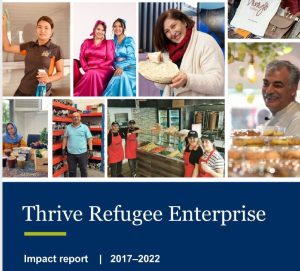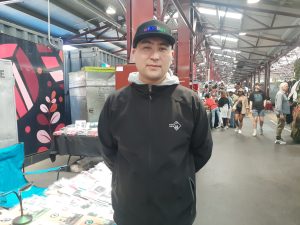Refugees supported to start businesses
More than 400 refugee and asylum seeker businesses have been established thanks to support from micro-finance not-for-profit outfit Thrive Refugee Enterprises.
About $7.1 million in loans have been issued to refugee entrepreneurs with 93 per cent fully repaid.
And an estimated $94 million of revenue has been generated, with $13 million paid in taxes.
These are the headline findings of a new impact report into Thrive’s first five years of operation.
The report also found 80 per cent of clients who were relying on government welfare support prior to starting their business no longer receive payments.
It paints a picture of how the opportunity for business ownership is transforming the lives of refugees and asylum seekers.
“The opportunities are enabling greater social, economic and cultural contributions to society. Clients and their families highlight personal outcomes – a sense of pride, empowerment and self-efficacy, feelings of connection to the community and increased hope for the future,” the report says.
“Thrive gives them the opportunity to work hard for themselves, and leverage their diverse skills and experiences for the benefit of Australia,” it says.
 Thrive was co-founded by former Vietnamese refugee and now private equity investor Huy Truong in 2017 to assist refugees and asylum seekers in Australia to become financially independent by starting or growing their own small business.
Thrive was co-founded by former Vietnamese refugee and now private equity investor Huy Truong in 2017 to assist refugees and asylum seekers in Australia to become financially independent by starting or growing their own small business.
The organisation helps refugees to overcome barriers to business ownership – offering clients access to flexible small business loans alongside targeted support, mentoring and resources to plan, start up and manage their small business or self-employment journey. Thrive businesses are in diverse industries driven by the skills, experiences, and passions of the business owner. They typically generate annual revenues of $90,000 and pre-tax earnings of over $60,000.
The report says refugees face a range of significant individual and systemic barriers to employment and after two years in Australia, only 20 per cent who are eligible to work are gainfully employed.
“These barriers to employment have flow on impacts to challenges with settlement and integration. Additionally, many refugees come from a small business or sole trader background in their home country but starting a business in Australia is out of reach due to unfamiliarity with the business environment and lack of access to both social and financial capital,” it says.
“Thrive’s service model is person-centred and tailored to the unique needs of refugees. It focuses on building strong client relationships and facilitates linkages across the refugee settlement and corporate sectors. It costs Thrive approximately $8,000 to finance and support a new refugee business, which is comparable to the cost of outcome payments to a Workforce Australia Employment Services Provider to place a jobseeker into employment,” the report says.
A Social Return on Investment study found that for every $1 invested into the organisation, $4.9 was generated in social and economic outcomes, including savings in social welfare.
Thrive estimates that at least 7,500 refugees are interested in starting a small business or becoming self-employed – 25 per cent of those in the job market.
The reports cites a Centre for Policy Development projecting that says launching 1000 new refugee businesses each year could yield $98 million in annual economic and fiscal gains.
In the coming years, Thrive’s mission is to kick start thousands more refugee-owned small businesses generating several hundreds of millions in economic income. In doing so, it seeks to establish self-employment and small business ownership as a genuine pathway for refugees to build their own financial success whilst contributing to Australia’s economy and society.
Mr Truong said Thrive’s focus was to activate the energy and entrepreneurialism many refugees brought with them.
“Years of experience have shown that refugees who are economically independent, integrate into their new country more quickly,” he said.
“Australia has a burgeoning service-based economy which provides abundant opportunities for self-motivated individuals to start their own business.
“There are certain service segments out there that just lend themselves to people who want to work hard,” he said.
“Things like domestic services like home cleaning, office cleaning, gardening … another one might be things like carpentry and cabinet making,” Mr Truong said.

Khalilullah Dydar
Refugee Khalilullah Dydar is one of the beneficiaries of Thrive’s support.
After securing a loan from Thrive, Khalil has established a well patronised stall at the Queen Victoria Market selling mobile accessories, LED caps and glasses; and he plans to expand his range.
He says he is cautiously confident about the future.
“I want to grow my business and build a new life here in Australia. But I’m worried about having a temporary visa,” Khalil said.
“In Australia we feel fully free. My kids are happy here; they are studying English and looking forward to starting school.
Khalil is a two time refugee. As a boy and a member of Hazara ethnic minority he fled the rise to power of the Taliban in his homeland in the 1990s. But his new life in Ukraine came to an abrupt end in February this year with the Russian invasion of his adopted country.
He and his extended family were forced to take and arduous journey to safety that took in Romania, Poland, Germany and Ireland.
Now, after just two months in Australia, Khalil has set out to build a third new life.












